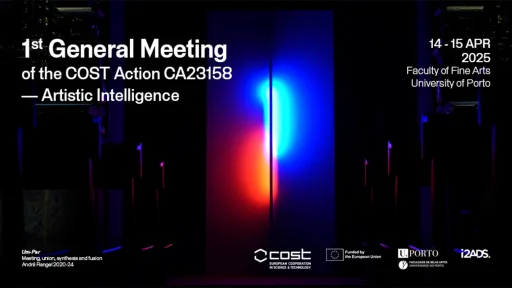14–15 April 2025, Faculty of Fine Arts, University of Porto (hybrid)
Introduction & Ambition
From 14 to 15 April 2025, the i2ADS‑hosted two‑day hybrid meeting convened at the Faculty of Fine Arts, University of Porto. The event brought together a diverse network of researchers, artists, technologists, and policy‑makers to explore Artistic Intelligence—here considered as the collective capacity of artistic and practice‑based research to generate value and impact beyond individual projects.
Participants engaged in deep exploration of how AI, machine learning, and computational tools can enhance practices in artistic research, while also strengthening referenceability, discoverability, equity, responsiveness, and responsibility in the arts.
Network & Structure
The Action unites experts across Europe—comprising 26 COST countries, with a strong representation from inclusiveness-target countries, early-career researchers, and gender-balanced cohorts.
The meeting format included:
- Core and Management Committee Meeting;
- Open plenaries with keynote presentations and flash statements introducing each WG’s goals.Technically engaged Working Group (WG) internal meetings;
- Working Groups Parallel Meetings;
- Artistic Intelligence Forum.
Keynotes featured Paulo Luís Almeida (Director i2ADS – Institute of Research in Art, Design and Society; Associate Professor, Faculty of Fine Arts, University of Porto), Ellen Røed (Professor, Film and Media; Vice Chancellor, Stockholm University of the Arts), Florian Schneider (Director, Institute for Creativity, University of Galway; PACESETTERS.EU Coordinator; Society For Artistic Research President), Johan A Haarberg, Franco Ripa di Meana (Accademia di Belle Arti di Roma; WP3 Lead, EAR), Ted Byfield (Co-founder, Open Syllabus; independent researcher, editor, and writer), and Chrysa Parkinson (Professor, dancer, performer; Project Leader, “Authorship, Ownership and Control”, Stockholm University of the Arts).
Talks explored themes such as authorship, research infrastructure, policy landscapes and the poetics of artistic doubt. Parallel working group sessions focused on four core areas: Adaptation Strategies, Collective Intelligences, Reference Frameworks, and Policy Making.
Reflections
The meeting was dedicated to a better understanding and recognition of relevant topics to address Artistic Intelligence as a response to urgent societal challenges of our time, from those relevant to the creative and cultural sectors to those that imply cross-disciplinary approaches with other forms of research.
It also served as an opportunity for active networking between Action members with highly diverse and complementary expertise in artistic research, creative practices, community-based approaches, data management and computational modelling, with the goal of connecting ongoing research projects, planning future research and advancing the application of new computational techniques to connect practice-based research across the arts.
As Artistic Intelligence (ARTinRARE) continues through its four‑year trajectory, it is positioned to catalyse new modes of referencing, linking, and valuing artistic practice in wider knowledge systems. This affords unprecedented opportunities for cross-domain researchers, artists, policy-makers, and cultural thinkers to engage, contribute, and co-create future-proof frameworks of intelligence.

